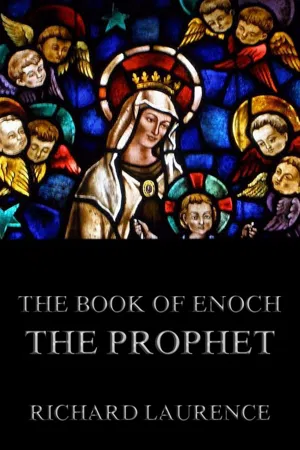The Book Of Enoch The Prophet
Richard Laurence
Contents:
The History of The Bible
THE BOOK OF ENOCH THE PROPHET
INTRODUCTION.
CHAP. I.
CHAP. II.
CHAP. III.
CHAP. IV.
CHAP. V.
CHAP. VI.
CHAP. VII. [SECT. II. ]
CHAP. VIII.
CHAP. IX.
CHAP. X.
CHAP. XII. [SECT. III. ]
CHAP. XIII.
CHAP. XIV.
CHAP. XV.
CHAP. XVI.
CHAP. XVII. [SECT. IV. ]
CHAP. XVIII.
CHAP. XIX.
CHAP. XX.
CHAP. XXI.
CHAP. XXII. [SECT. V. ]
CHAP. XXIII.
CHAP. XXIV.
CHAP. XXV.
CHAP. XXVI.
CHAP. XXVII.
CHAP. XXVIII.
CHAP. XXIX.
CHAP. XXX.
CHAP. XXXI.
CHAP. XXXII.
CHAP. XXXIII.
CHAP. XXXIV.
CHAP. XXXV.
CHAP. XXXVII. [SECT. VI. ]
CHAP. XXXVIII.
CHAP. XXXIX.
CHAP. XL.
CHAP. XLI.
CHAP. XLII.
CHAP. XLIII.
CHAP. XLIV.
CHAP. XLV. [SECT. VII. ]
CHAP. XLVI.
CHAP. XLVII.
CHAP. XLVIII.
CHAP. XLVIII.
CHAP. XLIX.
CHAP. L.
CHAP. LI.
CHAP. LII.
CHAP. LIII.
CHAP. LIV.
CHAP. LV.
CHAP. LVI. [SECT. IX. ]
CHAP. LVII.
CHAP. LVIII. [SECT. X. ]
CHAP. LIX.
CHAP. LX.
CHAP. LXI.
CHAP. LXII.
CHAP. LXIII.
CHAP. LXIV. [SECT. XI. ]
CHAP. LXV.
CHAP. LXVI.
CHAP. LXVII.
CHAP. LXVIII.
CHAP. LXIX. [SECT. XII. ]
CHAP. LXX.
CHAP. LXXI. [SECT. XIII. ]
CHAP. LXXII. [SECT. XIV. ]
CHAP. LXXIII.
CHAP. LXXIV.
CHAP. LXXV. [SECT. XV. ]
CHAP. LXXVI.
CHAP. LXXVII.
CHAP. LXXVIII.
CHAP. LXXIX.
CHAP. LXXX.
CHAP. LXXXI.
CHAP. LXXXII. [SECT. XVI. ]
CHAP. LXXXIII.
CHAP. LXXXIV. [SECT. XVII. ]
CHAP. LXXXV.
CHAP. LXXXVI.
CHAP. LXXXVII.
CHAP. LXXXVIII.
CHAP. LXXXIX.
CHAP. XC. [SECT. XVIII. ]
CHAP. XCI. [SECT. XIX. ]
CHAP. XCII.
CHAP. XCIII.
CHAP. XCIV.
CHAP. XCV.
CHAP. XCVI.
CHAP. XCVII.
CHAP. XCVIII.
CHAP. XCIX.
CHAP. C.
CHAP. CII
CHAP. CIII.
CHAP. CIV.
CHAP. CIV.
CHAP. CV.
The Book of Enoch, R. Laurence
Jazzybee Verlag Jürgen Beck
86450 Altenmünster, Germany
ISBN: 9783849621841
www.jazzybee-verlag.de
The History of The Bible
Bible (Gr. βιβλία, books), the name applied by Chrysostom in the 4th century to the books of the Old and New Testaments, which had been called the "Scripture." The ancient plural has been transformed into a singular noun, in view of the recognized unity of the books of the Bible, which is thus called The Book by way of eminence. The Bible has two general divisions, the Old Testament and the New; the Greek διαθήkn meaning disposition by will, is used both in the Septuagint and in the Greek New Testament for the "covenant" or compact between God and man. The Old Testament was divided by the Jews into three parts, viz., the law, the prophets, and the sacred writings. The law comprised the five books of Moses. The prophets comprised the earlier prophets, so called - the books of Joshua, Judges, 1 and 2 Samuel, 1 and 2 Kings; and the later prophets - three major, Isaiah, Jeremiah, and Ezekiel, and 12 minor, Hosea to Malachi. Under the sacred writings were included the poetical books, Psalms, Proverbs, Job; the "Five Rolls," Canticles, Ruth, Lamentations, Ecclesiastes, Esther; also the books of Daniel, Ezra, Nehemiah, and 1 and 2 Chronicles. The number of the books and their grouping have varied in different versions.
Our English Bible gives 39. Jerome counted the same books so as to equal the 22 letters of the Hebrew alphabet; Judges and Ruth, the two books of Samuel, two of Kings, two of Chronicles and the 12 minor prophets making five books. The later Jews of Palestine counted these 24. As to their order, the Masoretic arrangement, which is that of our present Hebrew Bibles, is very ancient. The Greek-speaking Jews, however, varied from those of Palestine, and their arrangement is preserved in the Septuagint, which is followed in the Vulgate and in our English Bibles; an order not according to chronological succession, but made with a view to grouping similar classes of composition together, the historical being placed first, the poetical next, and the prophetical last. The historical division opens in the book of Genesis with an account of the creation of all things, then takes up the history of the Hebrews as a matter of central interest, showing the separation of the family of Abraham from other nations and their prosperous settlement in Egypt. Exodus describes the escape of the Israelites from Egypt and their organization as a nation under the Mosaic law. Leviticus contains the more special laws of Israel, chiefly those relating to the public worship, festivals, and similar topics.
Numbers, with a supplement to the laws, narrates the weary march through the desert, and the opening of the contest for the land of Canaan. In Deuteronomy Moses, drawing near death, reminds the people of the experience they have gone through and the laws they have received, and exhorts them to obedience to God; then appoints a successor, and, taking a first and last look at the land not yet entered, dies. The book of Joshua describes the conquest and partition of Canaan, and the leader's farewell exhortation and death. In the next book, Judges, we read of anarchy and apostasy, and the consequent subjugation of the Israelites by their heathen neighbors, and the exploits of heroes raised up to deliver them. The books of Samuel give his history as prophet and judge, and the story of Saul and David. The books of Kings tell of David's death, the brilliant reign of Solomon, and the subsequent decline, the revolt of the ten tribes, the overthrow of the seceded kingdom of Israel and the fall of the kingdom of Judah into captivity, and the fate of the remnant left in Judea while their brethren were carried away captive. These books tell also of those prophets who testified for God in the face of wicked kings and a degenerate people.
The Chronicles are a supplementary work, and are accompanied by the book of Ruth, an episode in the time of the judges, narrating with...
